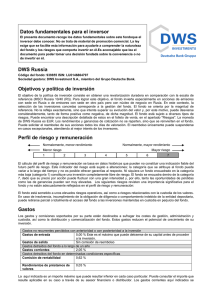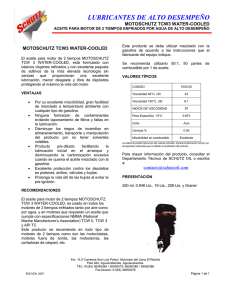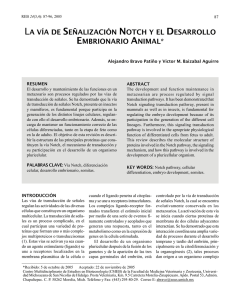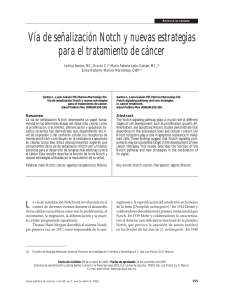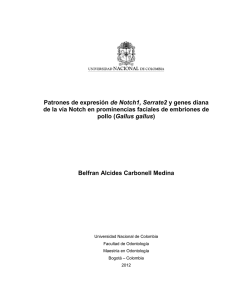INVE MEM 2014 192074
Anuncio
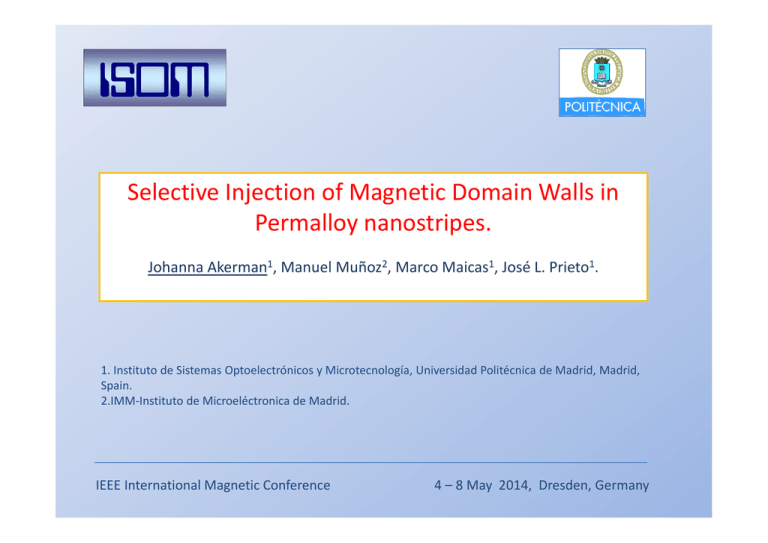
Selective Injection of Magnetic Domain Walls in Permalloy nanostripes. Johanna Akerman1, Manuel Muñoz2, Marco Maicas1, José L. Prieto1. 1. Instituto de Sistemas Optoelectrónicos y Microtecnología, Universidad Politécnica de Madrid, Madrid, Spain. 2.IMM‐Instituto de Microeléctronica de Madrid. IEEE International Magnetic Conference 4 – 8 May 2014, Dresden, Germany Motivation Future Magnetic Memory Devices Exquisite control Reliable Injection Controlled Pinning Defined Depinning Process Different types of DWs: • Notch dimensions (Zhu APL 2012, Faulkner JAP 2004) • Stripe thickness (Bogart PRB 2009) • Stochastic behaviour (Boklage APL 2013, Im PRL 2009, S.S.P. Parkin et al. Science 320, 190 (2008) Akerman PRB 2010) Which type of DW will likely pin?? We explore the conditions of DW injection CI Depinning: Joule Heating /STT • Spatial Distribution of J and magnetization around the notch. Selective Pinning of different types of DWs Device Fabrication & Experimental Setup C A 50 Ω B Hinj IDC • E‐beam Lithography Sputtering Lift Off • Ta/Py(10nm)/Ta/Pt 300 nm wide • 3 Notch Shapes: 300 nm 100 nm • V pulse : 1,4V 10ns • Hprop ≈ 2 Oe Good!! Quasistatic Pinning Number of Events 100 80 60 8 Oe 40 • Hinj = 0 Oe < Hprop 1 type Unpinned DWs !!! 20 Hinj = 0 Oe 0 0,0 0,1 0,2 0,3 0,4 Resistance () Dynamic Pinning • Hinj = 8 Oe > Hprop 1 Type Pinned DWs !!! Number of Events 100 80 60 40 20 Hinj =8 Oe 0 0,0 0,1 0,2 0,3 Resistance () 0,4 (Prieto PRB 2011, Muñoz Nat Comm 2011) Results Hinj 250 20 Oe 200 150 10 Oe 100 50 • Hinj = 0 Oe 1 peak at 0.20 Ω Unpinned TWs • Hinj = 10 Oe ≈ Hwalker 0.19 Ω 0.22 Ω 0.27 Ω 0.32 Ω 0 Oe 0 0,0 0,1 0,2 0,3 0,4 Resistance () Micromagnetic Simulations: OOMMF • α =0.01 Similar AMR Value • H 5,5mT • VCCW TCCW Above Hwalker + No depinning events All DWs types should be there!! • Hinj = 20 Oe Only 2 peaks??!! VCW TCW TCCW VCCW 1,5 RDW(a.u.) Number of events 300 1,2 0,9 0,6 0,3 0,0 0 2 4 6 8 0Hinj (mT) 10 12 Results Number of Events 300 300 250 250 & & Hinj 20 Oe 200 200 & 150 150 100 100 10 10 Oe Oe 50 50 0 0 0 Oe 0,0 0,0 0,1 0,1 0,2 0,2 0,3 0,3 • Hinj = 0 Oe 1 peak at 0.20 Ω Unpinned TWs • Hinj = 10 Oe 1st peak at 0.185 Ω 2nd peak at 0.220 Ω 0.230 Ω • Hinj = 20 Oe 1 peak 0,4 0,4 Resistance () 3,0 Micromagnetic Simulations: OOMMF VCW TCW TCCW VCCW 2,5 RDW(a.u.) • VCCW TCCW. 360º 2,0 1,5 1,0 0,5 0,0 0 2 4 6 8 0Hinj (mT) 10 12 Notch 3,0 2,5 RDW (a.u.) Micromagnetic Simulations: Oommf • Similar to Square notch. • TCCW smaller dependency with Hinj 0,19Ω at Hinj =20 Oe VCW TCW TCCW VCCW 2,0 1,5 1,0 0,5 0,0 0 2 4 6 8 0H (mT) inj 10 12 & & & & Conclusions • Hinj = 0 Oe TCCW + TCW Hinj >Hwalker + No depinning events 300 Number of Events • We have studied the conditions of DW injections that allow selective pinning of different types of DWs. Hinj 250 20 Oe 200 150 10 Oe 100 50 0 Oe 0 0,0 0,1 0,2 0,3 0,4 Resistance () • The apparent absence of some DWs at high or moderate Hinj indicates that AMRs of different DWs gets similar! • Changing the shape of the notch alters slightly the notch pattern. • Careful should be taken when associating a value of AMR to a type of DW!!! Thank you for your attention TCCW 7.2mT TCCW 7.2mT TCCW 7.2mT TCCW 7.2mT VCW 8 mT VCCW 8 mT Mismo tamaño misma AMR TCW 3.6mT Esto explica los dos picos del triangulo a Hinj=20Oe. Es el valor de la ARM de la pared justo antes de depinearse. Fact 1 Todo cuadraría si no fuera porque la TCW va a su puta bola básicamente y no puedes decir a campo “a campo alto” para esto porque en teoría a campo alto debería haberse ido. Si te fijas en la tesis de Hayashi, en la imagen de MFM la TC (pag 57) aparece pineada en el centro del notch y no a su derecha como en mis simulaciones. Esto explica que se necesite mas campo para depinearla, en la realidad que en la simulaciones. ¿Porque pasa esto? Se podría argumentar esto con el Stochastic pinning que a campo alto la pared esta mas distorcionada y se pinea mas? Por eso cuando deberia desanclarse sigue pineada, que en la simulaciones no se ve pero en la realidad existe y esta medido. Fact 3
